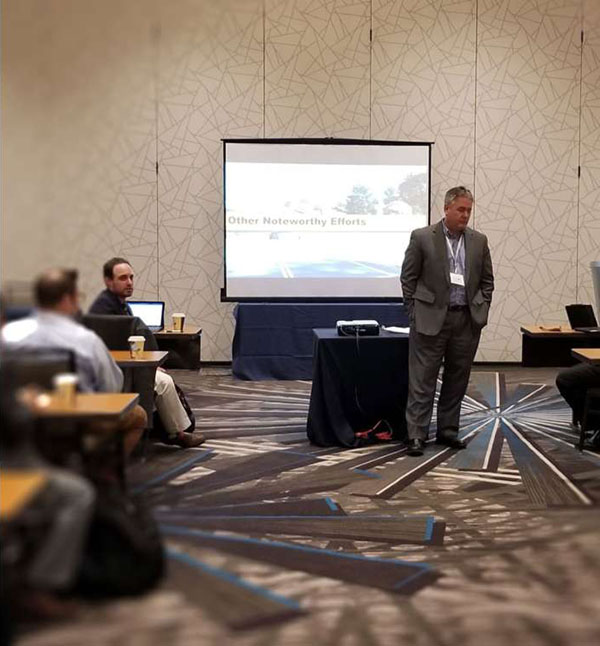
Stakeholder meeting in Arlington, VA. Image Source: Niloo Parvinashtiani
The efforts to gather potential noteworthy speed management practices consisted of a range of outreach efforts, including three roundtable workshops, as noted below. The objective was to identify agencies who have been involved in engineering, enforcement, education, or advocacy efforts to reduce speeding.
The first workshop was conducted on April 3, 2019, in Arlington, Virginia, concurrently with the Institute of Transportation Engineers Joint Southern and Mid-Colonial District Annual Meeting. The discussion topics included agency speed management practices, policies, countermeasures, setting speed limits, and law enforcement. These discussions were facilitated by subject matter experts along with several guest speakers including Adam Greenstein (WSP), and Eddie Reyes (Director at Prince William County Office of Public Safety).
The second workshop was a webinar conducted on June 13, 2019. Similar to the Arlington workshop, information was shared on agency speed management practices and policies, advocacy, setting speed limits, law enforcement, and countermeasures. The webinar included presentations by subject matter experts along with several guest speakers including Veronica Vanterpool (Deputy Director, National Vision Zero Network) and Chief Daniel Sharp (Police Department for the town of Oro Valley, Arizona). Participants were engaged during the webinar by participating in live polls, using the chat pod, and using a post-webinar evaluation survey.
The third workshop was conducted on July 21, 2019, in Austin, Texas during the Joint ITE International and Texas District 2019 Annual Meeting and Exhibit. These discussions were facilitated by subject matter experts along with several guest speakers including Brian Burk (Senior Engineer with Travis County Public Works, TX), Commander Eric Miesse (Austin Police Department), Randy McCourt (President, DKS Associates), and Sarah Abel (Technical Programs Manager, ITE). Several issues were discussed around the need for outreach, the lack of resources to address speed management, the necessity for a collaborative approach, data collection, and management issues.
In addition to these workshops, a number of supplemental outreach efforts were made to seek out speed management practices with an even wider audience including the following:
- Attending relevant national committee meetings or distribution of email to committee members. This included ITE Safety Council, ITE Traffic Engineering Council, ITE Vision Zero Steering Committee, Transportation Research Board (TRB) AHB65- Committee on Operational Effects of Geometrics, TRB ANB20(5)-Traffic Speed and Safety - Cross cutting Issues Joint Subcommittee, Highway Safety Partners Venture Meeting (HSPV), American Association of State Highway Transportation Officials (AASHTO) Traffic Engineering Committee 2019 Annual Meeting, and National Operations Center of Excellence (NOCoE) road weather management peer exchange
- FHWA/ITE Joint Speed Management Workshop during joint ITE/Midwestern and Great Lakes District 2018 Annual Meeting and Exhibit
- Case study online screening form distribution
- ITE membership outreach including ITE e-newsletter (Spotlite), ITE district/Section/Chapter newsletter, and ITE All Member e-community
- Attending other relevant meetings (GHSA-IIHS National Forum on Speeding, 29th Annual Governor's Highway Traffic Safety Conference)
- FHWA and project's Technical Advisory Committee
- Internet search
A total of 93 initial noteworthy practices were identified through the activities described above. The 93 initial noteworthy practices were narrowed to 36 potential noteworthy practices based on the following:
- Available content (initial scan of information to describe what the noteworthy practice is)
- US-based (although international examples were included, more weight was given to US examples)
- Additional information was gathered and the 36 potential noteworthy practices were reviewed. The practices were narrowed again to 15 top priority noteworthy practices based on the following:
- Representation of a range of practices
- Sufficient information to pursue a case study
- MUTCD compliant strategies (if applicable)
Case studies were selected from a cursory review of the information and initial discussions. A final 15 top priority case studies were identified and ultimately a final eight were selected in conjunction with the project TAC for documentation following discussions with individual agencies.
